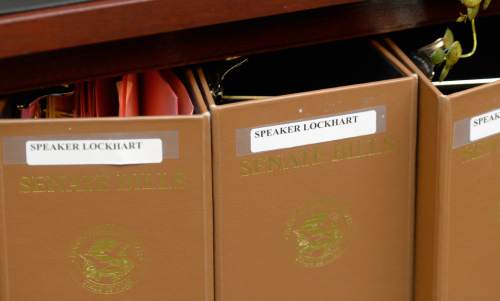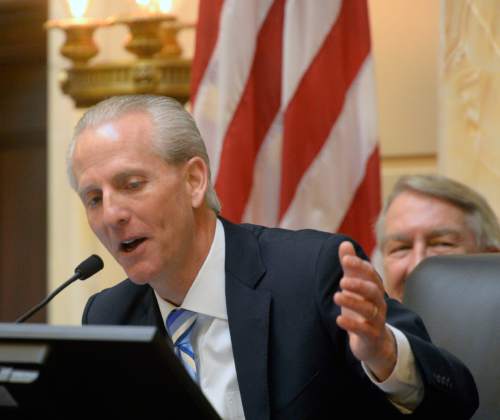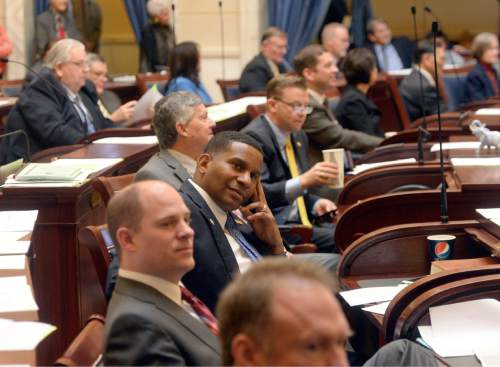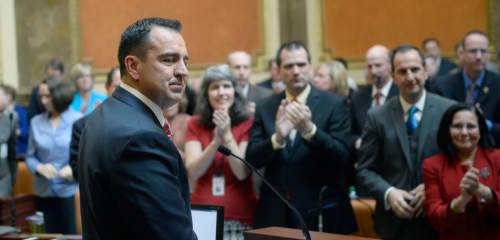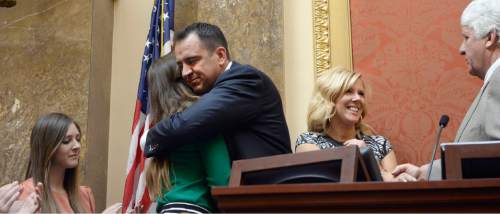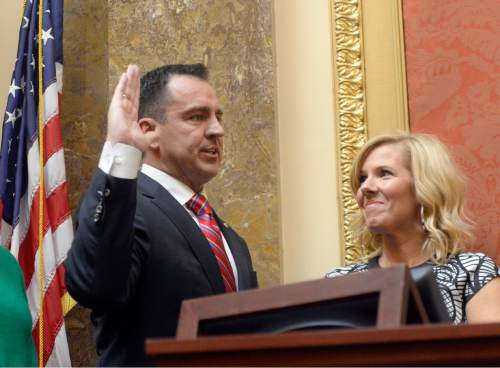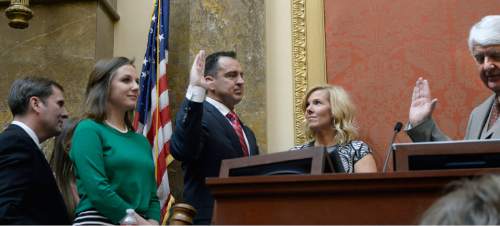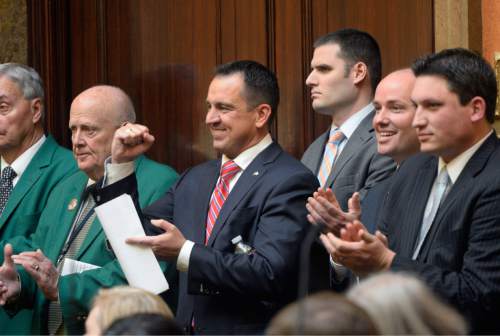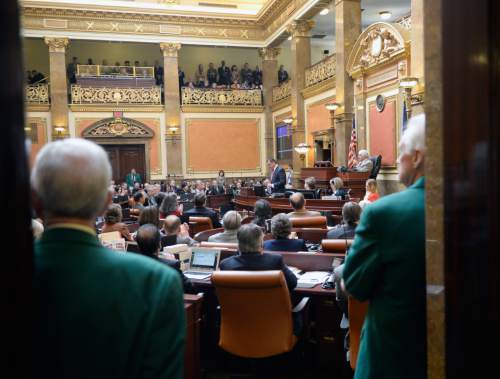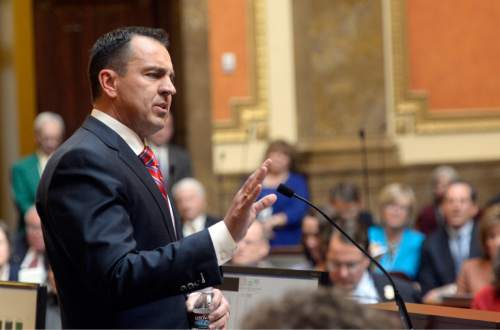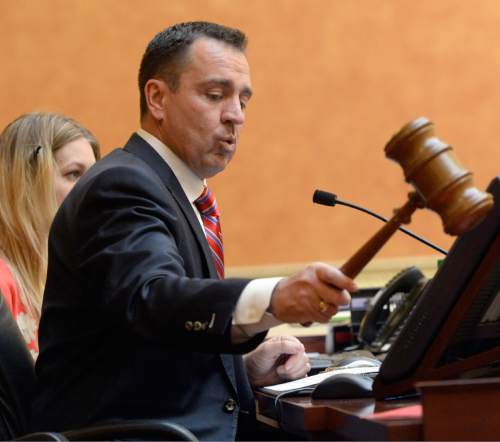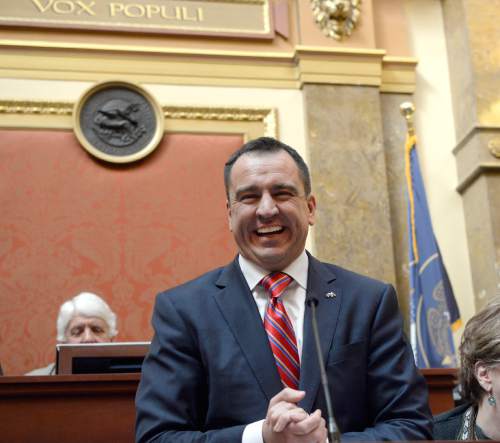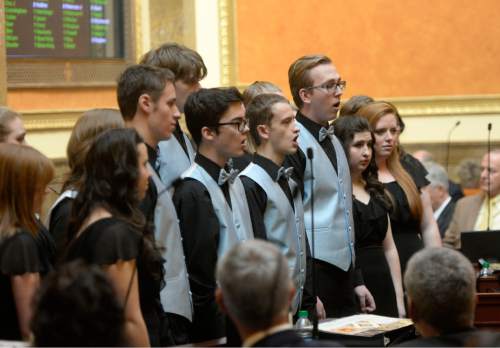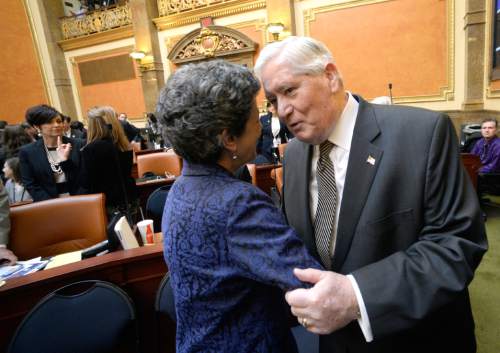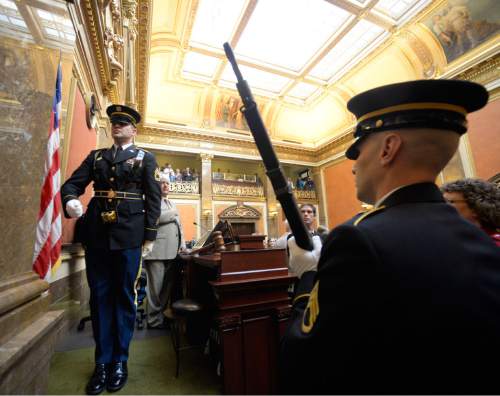This is an archived article that was published on sltrib.com in 2015, and information in the article may be outdated. It is provided only for personal research purposes and may not be reprinted.
As the curtain lifted Monday on the 61st Utah Legislature, there were new faces, old issues and a commitment from leaders to tackle the heavy matters ahead in the next 45 days.
The House opened with a somber tone, remembering former House Speaker Becky Lockhart, who died Jan. 17, stricken by an extremely rare degenerative neurological disease, days after the end of her term.
"Speaker Lockhart, more than anybody, would tell us that we have a job to do and we need to move forward and get to work. As I recall, she wasn't a big fan of inaction," said new House Speaker Greg Hughes, R-Draper, making reference to Lockhart's opening remarks a year ago, when she jabbed Gov. Gary Herbert as "an inaction figure."
Similarly, the Senate had a moment of silence for Lockhart.
"Her untimely passing remind us of our mortality and the unpredicatable nature of our lives," said Senate President Wayne Niederhauser. "It is paramount that we work with energy and passion. But let us not forget the important things of life."
The Legislature will grapple with a number of weighty issues: whether to use federal money available under Obamacare to help extend health insurance to about 100,000 of the poorest Utahns; whether to raise taxes for transportation; where to build a new prison and how to reform corrections policies; how to clean up Utah's murky air; and how to best educate Utah's schoolchildren.
"I don't recall being faced with so many big issues in one session. It will surely test our courage and wisdom and our ability to set politics aside to do what is right for both the long-term health and prosperity of our state. So buckle up, let's go to work," Niederhauser said.
Hughes said this should be the year that legislators get serious about solutions for the issues, many of which have arisen year after year, reminding him of the movie "Groundhog Day."
"Now is the time to take action and get to work doing the difficult, but transformative, things that lie ahead," Hughes said.
"Now is the time to prepare for our future by reforming our broken transportation formula," he said. "Now is the time to push back against the federal government and insist that we control our lands, our health care and our schools. And now is the time to ensure that our schoolchildren are given the best education possible."
Opening ceremonies in the Senate included music by the Utah Symphony Brass Sextet and an opening prayer by Elder David A. Bednar, member of the LDS Quorum of the Twelve Apostles.
Bednar prayed that legislators may "have capacity beyond their own vision to see what they might not be able to see, judgment to consider, evaluate and decide in a manner that may be most remarkable."
In the House, the prayer was offered by former LDS Presiding Bishop H. David Burton, who replaced Hughes as chairman of the board of the Utah Transit Authority. He prayed, "may it be a House where the agendas of men are set aside for the good of people of this state."
Republicans hold vast majorities in both chambers. Senate Republicans hold a 24-5 margin over Democrats. In the House, Republicans hold a 63-12 majority, the second-biggest GOP majority in the past 80 years.
The new Legislature includes its first black woman — Rep. Sandra Hollins, D-Salt Lake City — and its first Asian woman — Sen. Jani Iwamoto, D-Holladay.
One of every five House members, 15 of 75, is a freshman. Among the newcomers are three members who had served previously and are returning: Reps. Brad Daw, R-Orem; Fred Cox, R-West Valley City; and Brad King, D-Price.
Three of the 29 senators are freshmen. Also, one returning senator is going by a new name. Rep. Luz Robles, D-Salt Lake City, who unsuccessfully ran for Congress last year, is now using her married name: Luz Escamilla.
They have money to meet many of the needs Hughes spoke of. The state economy is growing at a pace not seen in years, leaving legislators a total of $638 million in surplus to parcel out this year, with education almost certain to get the bulk of the money.
Most of the part-time legislators have full-time jobs ranging from rancher to architect, art dealer, accountant, banker, dentist, developer, electrical contractor, engineer, farmer, former college president, homemaker, Highway Patrol officer, insurance agent, labor-union leader, pharmacist, teacher and trucking-company owner.
The Legislature includes 18 lawyers, by far the most popular profession among lawmakers. Distantly behind that in popularity are four doctors, three bankers and three ranchers. However, 14 legislators are involved in the real-estate industry in a variety of jobs from developer to appraiser and real-estate agent.
Twitter: @RobertGehrke


